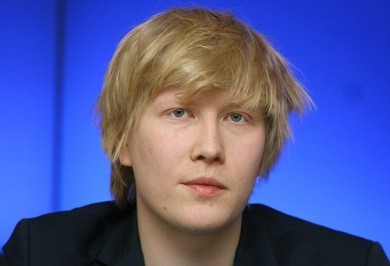Opera mystery in two acts after the novel by Fyodor Dostoevsky
Performed in Russian with English supetitles
Towards the close of the XVI International Stars of the White Nights Festival of Arts, the Mariinsky Theatre presented the world premiere of St
Petersburg composer Alexander Smelkov's opera The Brothers Karamazov after the novel of the same name by Fyodor Dostoevsky. The libretto by Yuri Dimitrin includes almost every dramatic clash of the novel in the twenty-five scenes of the two-act opera.
Alexander Smelkov's opera is the first for several decades at the Mariinsky Theatre by a contemporary, living composer, and which promises to be a highlight of Russia's cultural life today. Alexander Smelkov's expressive and vivid music contains echoes from numerous genres (from the everyday romance to sacral chant), stylistic influences (from Musorgsky and Tchaikovsky to Shostakovich), while still remaining a truly original work by the composer, expressing the desire of human existence for utter truth while ensnared by passions and vices.
PRESS REVIEWS
On the whole it may be said that the opera has succeeded in life… The musical emotions, roused by Gergiev, constantly take us to the edge, and the unbelievable functional set designs by Zinovy Margolin, already beyond all doubt or disagreement acclaimed as one of his best works, in each and every single detail tells us about something close to us, something recognisable, ramshackle and very spiritual... The inventiveness of the performers in The Brothers Karamazov is all thanks to young stage director Vasily Barkhatov, who has staged a detailed, refined production that is not at all childish in its construction, where practically everyone of the vast number of characters of Dostoevsky is distinctly drawn, moreover several times (he worked on the piece with several casts).
Yekaterina Biryukova. Afisha
Set within twenty-five scenes and slightly under three hours of music, the composer has succeeded in creating not a mosaic picture “after motifs of Dostoevsky”, but a work that is surprisingly integral and impressive. Dostoevsky wrote a “tragic novel”, Smelkov a “mystery opera” – it could be said with every right to do so in as much as the “life” moments and actual happenings figure in the work in a complex blend with historical and folkloric symbolism. Apropos, if you call it an opera or not, whatever serves as the basis of the libretto, the main and most important part of such a work is nonetheless always the music. It is pleasing that it was this score that was the main success of the premiere – and, possibly, the main event of the past season.
Gazeta. SPb
... It was with the living, passionate emotions of the singers and the established, expected expression of the orchestra that Smelkov’s opera seized the Barbican Hall, pushing aside the scepticism of music critics who did not wish to judge a work to be of any quality that tacked together the ideas of other composers – from Tchaikovsky to Prokofiev and Shostakovich. The public at the Barbican was frenzied by the passion, by the savagery of the characters, by the truly – “Dostoevskian” – spiritual fever as performed by the singers – Vasily Gorshkov, Avgust Amonov, Alexei Markov, Vladislav Sulimsky, Andrei Popov, Gennady Bezzubenkov, Kristina Kapustinskaya, Olga Trifonova, Elena Nebera and Alexander Timchenko among others.
Irina Muravieva. Rossiiskaya Gazeta
The almost four-hour-long performance ended with a stormy ovation. But the public applauded not for the innovativeness but for the traditionalism. They applauded the justified expectations – that music of the 21st century has not perverted words of the 19th century. That Dostoevsky’s protagonists on stage were exactly as imagined by the majority of readers, even from their school years. That the production team (stage director Vasily Barkhatov and set designer Zinovy Margolin) conveyed their interest in the idea and the content, reconciling their own ambitions and the draw of self-expression.
Elena Gubaidullina. Kultura
 Mariinsky Theatre:
Mariinsky Theatre:  Mariinsky-2 (New Theatre):
Mariinsky-2 (New Theatre):  Mariinsky Concert Hall:
Mariinsky Concert Hall: 

